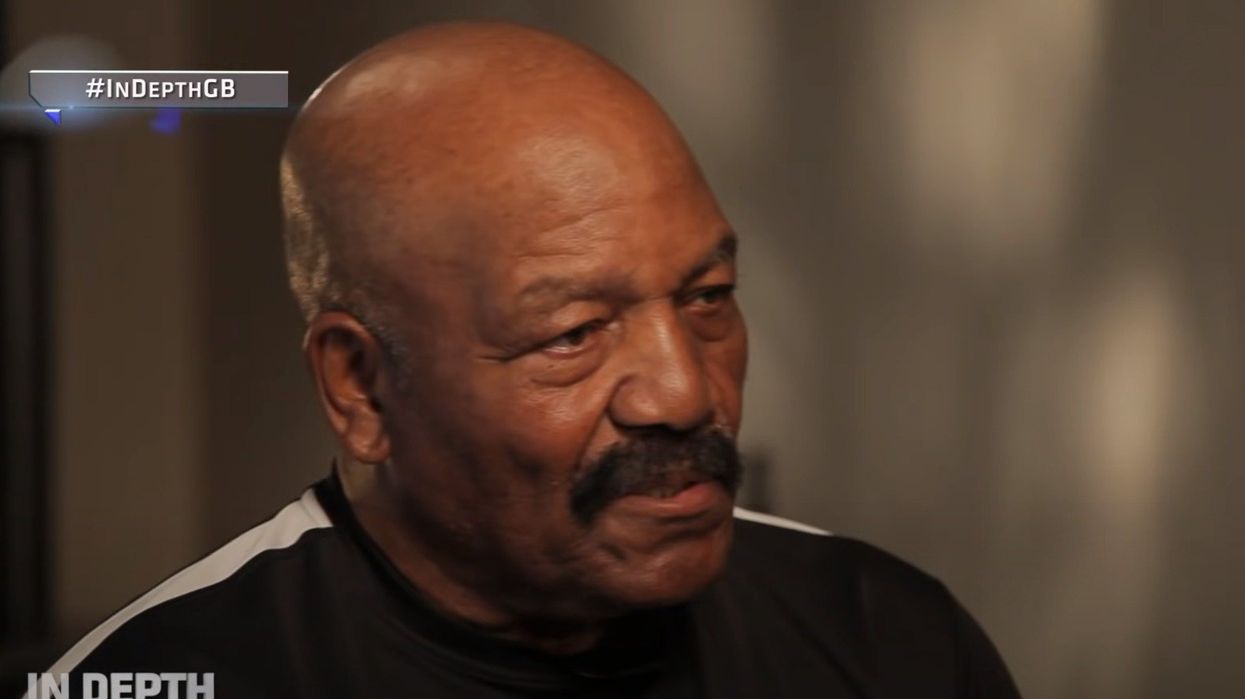How Jim Brown Led American Sports From Jack Johnson To Brittney Griner
Jim Brown was a monster, not only as a wrecking-ball running back on the football field but also as a prime example of an ever more popular obsession with people (mostly men) whose admirable achievements are shaded by despicable behavior (mostly directed at women). He died last month at 87 and his obituaries, along with various appraisals of his life, tended to treat the bad stuff as an inevitable, if unfortunate, expression of the same fierce intensity that made him such a formidable football player and civil rights activist.
Often missed, however, was something no less important: what a significant figure he was in the progress of the Black athlete from exploited gladiator — enslaved men were the first pro athletes in America — to the sort of independent sports entrepreneur emerging today. Brown was a critical torchbearer and role model on the century-long path between the initial Black heavyweight champion, Jack Johnson, who went to jail for his “unforgivable blackness,” and one of the greatest basketball players ever, LeBron James, who was the first Black athlete to successfully create his own narrative from high school on.
Jim Brown didn’t control his narrative until 1966. By then, he had already spent nine years in pro football, retiring at the peak of his sports career in what was then both condemned and acclaimed as manly Black defiance. In doing so, he presaged Muhammad Ali’s refusal to be drafted during the Vietnam War and the Black-power salutes of protest offered by medal-winning runners Tommie Smith and John Carlos as the Star-Spangled Banner began to play at the Mexico City Olympics of 1968.
A Life Demanding Study
A year after retiring from football to concentrate on his movie roles, Brown organized “the Cleveland Summit” in which the leading Black athletes of that time, including basketball’s Kareem Abdul Jabbar (then known as Lew Alcindor), debated whether they should support Muhammad Ali’s refusal to join the Army. Their positive decision, based on Ali’s in-person defense of his antiwar moral beliefs, was important to so many Americans’ acceptance of his sincerity. It was also a glimmer — as yet to be fully realized — of the potential collective power of Black athletes. And it was all due to how much Brown was respected among his peers. His close friend Jabbar, an important voice in his own right, has written that “Jim’s lifelong pursuit of civil rights, regardless of the personal and professional costs… illuminated the country.“
And that’s probably more than you can say for Miles Davis, Ernest Hemingway, Pablo Picasso, or Roman Polanski, among the dozens of male stars of one sort or another whose lives have been reevaluated in the wake of the #MeToo movement and a question it raises: “Can I love the art [sport] and hate the artist [athlete]?”
As Nation magazine sports editor and Brown biographer Dave Zirin has pointed out, “Brown’s life calls for more than genuflection or dismissal; it demands study.”
Indeed! Consider some of the countervailing pieces of evidence to his greatness. Although never convicted, Brown was accused of a number of acts of violence against women, which he, along with the male-dominated culture of his time, tended to dismiss as of no significance. In one notorious and oft-recounted incident, he was accused of throwing a woman off a second-floor balcony. He always denied it, claiming she fell while running away from him. Tellingly, when the victim declined to press charges, macho culture interpreted that as proof of his irresistible virility, an extension of his being, arguably, the all-time greatest football player ever (and he was thought to have been even better at lacrosse in college). His brutal style of play would later be reflected in his aggressive, independent style of business and everyday life.
That image gathered force when he was 30 and in London on the set of his second film, The Dirty Dozen. It was then that Cleveland Browns owner Art Modell threatened to fine him daily if he didn’t show up on time for pre-season football training, which was soon to begin. Brown, then one of the sport’s major stars, eventually responded by simply quitting football.
It was perceived as a battle of wills. Modell was usually characterized as a boss always operating in the best interests of his team or (though this was rarer in those days) a classically uncompromising, deeply entitled Big Whitey plantation owner. And Brown was either seen as a defiant Black man, ungrateful for his celebrity and money, or like Ali, as a warrior prince of Black manhood. As in the heavyweight champion’s case, the reality was, of course, far more complex.
On Raquel’s Team
At the time, Brown was conflicted about his choices. In May 1966, as a sportswriter for the New York Times, I happened to be in London covering an Ali fight and had been invited to the Dirty Dozen movie set. Brown confided to me that the film was far behind schedule and there was no way they’d finish shooting his part so he could make pre-season practice in a timely fashion. He had, in fact, hoped to play one more season, his tenth, but couldn’t imagine bailing on the production before the film was wrapped. There were just too many people dependent on him, he told me, and so the Browns would have to wait. After all, it wasn’t as if he were going to miss regular-season games.
But Modell’s insistence that he return immediately (echoed by the media) eventually pushed him into a corner. And Hollywood simply seemed like the better choice — a potentially longer career, more money, and less physical damage. Indeed, Brown would go on to succeed as the first Black action hero in mainstream movies. His on-screen interracial sex scene with Welch in the 1969 film 100 Rifles would also be considered a Hollywood first.
His football retirement, which began as expedience, would only enhance his macho aura, which, for better or worse, was all too real. That same year, in Toronto (also to cover an Ali fight), I found myself having dinner at a Chinese restaurant with Brown, Carl Stokes, soon to be the first Black mayor of Cleveland, and comedian and activist Dick Gregory, whose autobiography I had written.
It was a lively, friendly meal until the check arrived. The waiter, an elderly Chinese man, set it in front of me. Stokes and Gregory burst out laughing and began bantering about the racism implicit in the poorest of the four of us getting the bill. But Brown suddenly leaped up, yelling at the waiter and grabbing for him. The other two managed to push him back into his chair, where he then sat, muttering to himself. Eventually, he did manage to see the humor in the situation, but initially he had been deeply offended, and that simmering rage of his (always a potential prelude to violence) seemed ever ready to boil over.
He was in his eighties the last time I saw him, moving slowly on a cane, and yet he still seemed like one of the two scariest athletes I had ever covered, men whose baleful glares rose so much more quickly than their smiles. (The other was former heavyweight boxing champion Sonny Liston.)
It should be no surprise that Brown’s contributions to advancing Black equality were of a piece with his complex life. After all, he often derided civil rights marches as nothing more than “parades” and his best efforts were directed toward lending a hand to the economic advancement of Black small businesses and marginalized former gang members.
What always seemed like a paradoxical conservative streak in him was, in fact, essential Brown, the mood of a man who believed that Black progress would never come from protests or demonstrations — they always seemed like a form of begging to him — but from the power of money, of muscling your way into the marketplace and buying into the system. He believed, in other words, in economic power above all else and, for what must have seemed to him like short-term pragmatic reasons, would end up allying briefly with two otherwise unlikely presidential figures — that football ultra-fan Richard Nixon and then former football franchise owner Donald Trump. Brown even went so far as to defend Trump when iconic civil-rights activist Congressman John Lewis called him an illegitimate president.
Forebears and Descendants
Brown’s unyielding rage evoked the earliest celebrity Black athlete who rattled white folks: Jack Johnson. Although that boxer’s style was different from Brown’s — living in the Jim Crow era, he flamboyantly derided his opponents and flaunted white girlfriends and wives — Johnson also offered a version of intimidating masculinity that led all too many white men to call for a “great white hope” to defeat him. It took the self-effacing, self-destructive Joe Louis, who carefully concealed his affairs with white movie stars, to calm their insecurities and become an acceptable hero for whites.
In recent years, the only athlete who’s come close to Brown’s steadfast individualism in the face of racism was Colin Kaepernick, whose insistence on kneeling during the pledge of allegiance before National Football League games got a distinctly mixed response from Brown. He liked the young quarterback, he said, but as an American couldn’t abide the desecration of the flag (another instance of Brown’s late-in-life cluelessness).
As Zirin aptly put it in his biography Jim Brown: Last Man Standing, his seeming paradoxes were those of a “flawed” figure who was “heroic but not a hero.”
LeBron and Brittany
LeBron James, Brown’s current successor as the model of a modern Black athlete, has proven a far more consistent figure. Already marked as the future of basketball in high school, he’s orchestrated his career in a remarkable fashion, moving to better teams and dictating his own terms in the process. Along the way, he’s also built up his business interests — always with a core of hometown friends — and expressed his opinions openly. While at the Miami Heat, he led his teammates in a protest against the shooting of an unarmed Black teenager, Trayvon Martin.
Not since the days of Muhammad Ali had such a big star been so willing to take such a controversial stand. The basketball superstar with whom LeBron is most often compared as a player, Michael Jordan, was known for avoiding anything that might harm the sale of his sneaker brand. LeBron on the other hand even called President Trump a “bum.”
He was indeed courageous, but of course, he could do that. Global capitalism had his back. It’s even more courageous to take a stand when true risk is involved. So, perhaps a hopeful harbinger of future athletic heroes — regardless of race, gender, or sexual orientation — were the members of the predominantly Black Atlanta Dream team in the Women’s National Basketball Association (WNBA) who, in 2020, wore T-shirts endorsing Raphael Warnock, the Black Democratic opponent of Georgia Republican Senator Kelly Loeffler. It was a gutsy move, since Loeffler, a white woman who had disparaged the Black Lives Matter movement, just happened to be the Dream’s co-owner.
It was, in fact, particularly gutsy because WNBA players are among the most vulnerable in big league sports, playing in a relatively small league that pays relatively low salaries — the average is $147,745 while eight players in the National Basketball Association make $40 million or more annually. That’s why so many of those women play internationally during their off-season. It’s why WNBA star Brittney Griner was en route to a Russian team when she was arrested and detained for 10 months after vaporizer cartridges with less than a gram of hash oil were found in her luggage. (She was finally released in a prisoner exchange last December.)
Although widely admired as warm and friendly, before her incarceration in Russia, Griner seemed to have something of Jim Brown in her personality. She was active with her Phoenix Mercury teammates in protests against the police murders of unarmed Black people and insisted that the national anthem should not be played before sporting events. Since returning from Russia, she’s been active in campaigns to release others who have been wrongfully detained. A lesbian, Griner and her partner were arrested in 2015 for assault and disorderly conduct in a domestic violence case. They subsequently married and divorced.
She may well be LeBron’s successor in the evolution of the Black athlete. At the least, her mission statement, as described in a 2019 interview with People magazine, is both humble and complete. She said: “People tell me I’m going to break the barrier and trailblaze. I just kind of look at it like, I’m just trying to help out, I’m just trying to make it not as tough for the next generation.”
These days, that’s heroic.
Robert Lipsyte is a TomDispatch regular and a former sports and city columnist for the New York Times. He is the author, among other works, of SportsWorld: An American Dreamland.
Reprinted with permission from TomDispatch.












